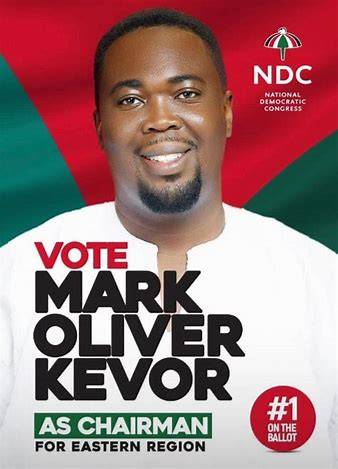NDC Set to Make History in Eastern Region: Chairman Predicts Major Victory
Introduction
The Eastern Region of Ghana is heating up politically as the National Democratic Congress (NDC) expresses strong confidence in securing a significant victory in the upcoming general elections. Dr. Mark Oliver Kevor, the Eastern Regional Chairman of the NDC, has boldly stated that the party is poised to reclaim dominance in the region. As the elections draw closer, the chairman’s remarks have sparked discussions across political circles, with many weighing the factors that could shape the outcome.
A Bold Claim with Historical Context
The Eastern Region, traditionally seen as a stronghold for the New Patriotic Party (NPP), witnessed NDC victories in both the 1992 and 1996 elections. Dr. Kevor's optimism stems from the belief that the NDC has strategically positioned itself to make significant gains in the region once again. According to him, the current political climate is reminiscent of the early 90s when the NDC enjoyed widespread support and clinched victory in the region.
Why the NDC Believes in Victory
Dr. Kevor outlined several reasons behind his confidence. One major factor is the growing dissatisfaction among the electorate regarding the current administration’s performance. Economic challenges, unemployment, and perceived corruption within the ruling party have fueled sentiments that could sway voters in favor of the NDC.
Another critical element is the reorganization and rejuvenation of the NDC's grassroots support in the Eastern Region. Over the past few years, the party has intensified efforts to rebuild local structures, engage youth groups, and address the concerns of rural communities. Dr. Kevor believes that this approach has rekindled the party's appeal and increased enthusiasm among potential voters.
Strategic Campaign Initiatives
Engaging the Youth and Grassroots
The NDC has been actively engaging the youth, recognizing their crucial role in determining electoral outcomes. Through town hall meetings, workshops, and community outreach programs, the party has been educating young voters on its policies and vision. In addition, social media campaigns have been ramped up to ensure consistent messaging and wider reach among the tech-savvy demographic.
Women and Marginalized Groups
Recognizing the pivotal role of women in politics, the NDC has also made gender inclusivity a core focus. Female leaders within the party have been at the forefront, addressing issues such as healthcare, education, and economic empowerment. By presenting strong female candidates in some constituencies, the party aims to galvanize support from women who feel underrepresented in the current administration.
Mobilizing Key Stakeholders
The NDC’s regional leadership has been proactive in mobilizing local chiefs, community leaders, and opinion influencers. By fostering dialogue and demonstrating a commitment to local development, the party aims to build lasting alliances that can translate into votes. According to Dr. Kevor, maintaining transparency and being present within communities are key to earning trust.
Political Climate in the Eastern Region
Shifting Allegiances and Changing Dynamics
While the NPP has historically dominated the Eastern Region, recent events have highlighted a shift in voter sentiment. Economic hardships, including rising inflation and high youth unemployment, have eroded some of the goodwill previously enjoyed by the ruling party. As a result, some constituencies that were once considered NPP strongholds are now being classified as battleground areas.
The Role of Party Unity
One of the most significant advantages for the NDC is the perceived unity within the party, particularly in the Eastern Region. Dr. Kevor emphasized that internal disputes have been minimized, and party members are focused on a common goal: victory in December. Unlike in previous elections where factionalism hindered their progress, the current leadership has succeeded in fostering cohesion.
Challenges Ahead
Despite the upbeat predictions, the NDC still faces considerable challenges. The NPP remains a formidable opponent with a well-organized campaign structure and a strong support base. Additionally, political analysts caution that predicting voter behavior solely based on economic dissatisfaction can be misleading, as ethnic and historical loyalties often play a role in Ghanaian elections.
Ensuring a Peaceful Election
In light of heightened political tensions, Dr. Kevor has also called for peaceful campaigning and urged supporters to avoid confrontations. He reiterated the NDC’s commitment to respecting democratic processes and working with electoral authorities to ensure free and fair elections.
Looking Ahead: What Victory Means for the NDC
Winning the Eastern Region would be a significant milestone for the NDC, as it would challenge the narrative that the area is solely an NPP domain. Such a victory would not only bolster the party’s chances at the national level but also demonstrate a shift in political dynamics. Dr. Kevor believes that a win would empower the NDC to deliver on its promises of job creation, improved healthcare, and education, particularly in underserved communities.
Conclusion
The NDC’s confidence in securing victory in the Eastern Region has ignited discussions across political and social spheres. As the race intensifies, both major parties will undoubtedly intensify their campaigns to win over undecided voters. For now, the NDC remains optimistic, with Dr. Kevor at the helm of their ambitious drive for electoral success. Whether this confidence will translate into actual votes will be revealed when Ghanaians head to the polls.
Stay updated with the latest news and developments as we continue to monitor the political landscape in Ghana's Eastern Region.


